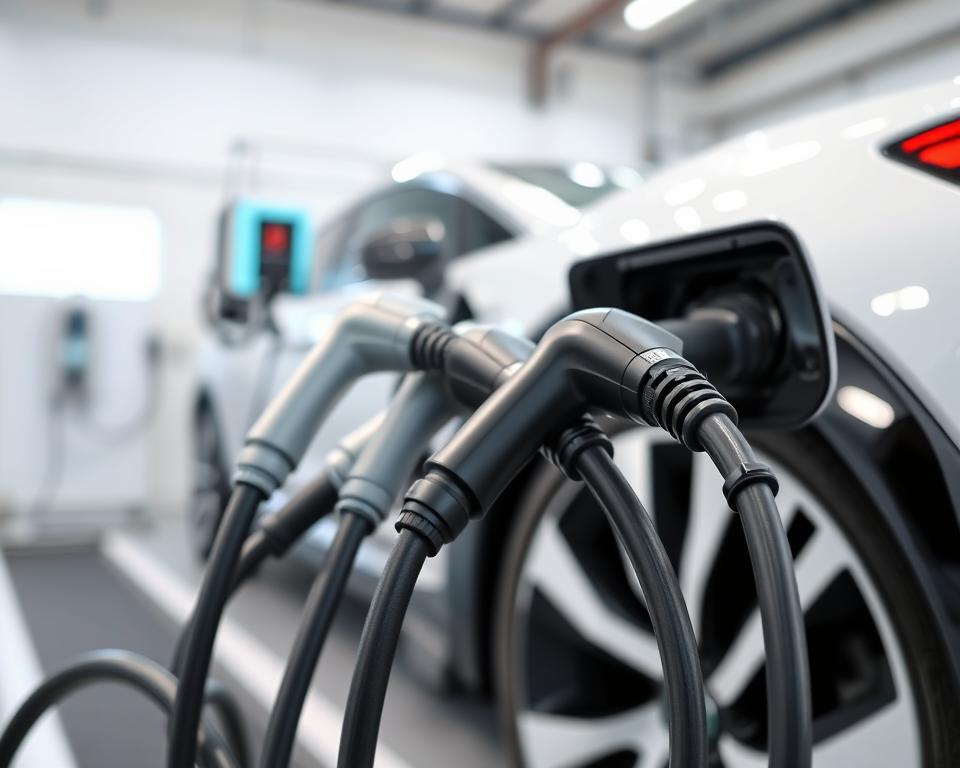Top EV Charging Cable Manufacturers for Your Electric Vehicle
The EV market is expanding rapidly, with the demand for reliable and efficient charging solutions increasing sharply. Currently, top brands have been at the cutting edge of this change, providing premium charging infrastructure. Southwire, for instance, entered the market in 2014 and excels, garnering 1000+ five-star reviews and a 75-year legacy in electrical construction.
The surge in electric vehicle adoption creates a requirement for durable, rapid, and secure Charger Manufacturers in China. Top manufacturers are developing to meet these evolving needs, offering solutions that boost the overall charging experience.
Understanding the differences between various charging solutions is crucial for selecting wisely. Quality charging infrastructure directly impacts vehicle performance and customer satisfaction.
Notable Observations
- Top manufacturers offer high-quality charging cables for improved durability and safety.
- The demand for efficient charging infrastructure is on the rise with the growth of the electric vehicle market.
- Industry leaders develop cutting-edge products for EV drivers.
- High-grade cables improve energy transfer and driving range.
- Opting for top-tier cables yields future savings.

The Growing Importance of Quality EV Charging Cables
As more drivers choose EVs, the importance of high-quality EV charging cables is undeniable. The performance, security, and reliability of electric vehicle charging systems rest on the quality of the charging cables used.
How EV Charging Tech Has Advanced
Electric vehicle charging technology has undergone significant advancements in recent years, with a shift toward speedy charge times and improved safety features. Modern EV charging cables are built for these requirements, featuring high-grade materials and advanced designs to minimize power loss and maximize charging efficiency.
Quality’s Impact on EV Charging
Quality charging cables directly impact the overall performance and safety of EV charging infrastructure. Durable features, such as weather resistance and temperature tolerance, maintain performance in harsh conditions. Additionally, regulatory compliance and adherence to industry guidelines are essential in guaranteeing safe operation.
| Key Features | Benefits |
|---|---|
| High-grade build quality | Reduced energy waste |
| Enhanced durability features | All-weather reliability |
| Standards adherence | Certified safety |
| Maintainability | Long-term value proposition, reduced waste |
Our high-performance cable solutions, such as those offered by Aichie Tech Electronics, are tested for quality and compliance in The Cable Lab. With repairable Portable EV Charger, users can save hundreds over a decade by choosing repairs over replacements, lowering environmental impact.
Top EV Charging Cable Manufacturers in China
A surge of cable makers in China supports the EV boom. These companies are crucial in supporting the expanding electric vehicle (EV) market, offering premium charging cables designed for various charging needs.
Wottz: Industry Leaders Since 2014
Wottz has been a leading cable manufacturer since 2014. They offer a range of cables that meet the specific requirements of EV charging systems, including Mode 1, 2, 3, and DC Fast Charging (Mode 4).
Aichie Tech Electronics’ 75-Year Legacy
Aichie Tech Electronics’ seven-decade legacy informs its premium cable designs. Their products are designed to meet the demands of both domestic and commercial EV charging infrastructure.
Other Notable Manufacturers in the Market
Specialists in Type 1/Type 2 connectors and environmental-resistant cables are emerging players. These include specialists in Type 1 (J1772) and Type 2 (Mennekes) connectors, as well as companies developing cables with enhanced flexibility and resistance to environmental factors.
Types of EV Charging Cables Explained
As electric vehicles become increasingly popular, understanding the various types of EV Charging Cable Manufacturers is crucial for optimal charging experiences. Different cables suit different charging needs. The variety in EV charging infrastructure demands a closer look at the cable options.
Comparing SAE J1772 and Mennekes Cables
Type1 and Type2 charging cables are two common standards used for EV charging. Type 1, also known as SAE J1772, is predominantly used in North America, while Type 2, or Mennekes, is the European norm. The choice between these cables depends on the vehicle’s connector type and the charging station’s compatibility. Type 2 cables often handle greater power, making them suitable for faster charging.
Level2 and DC Fast Charging Solutions
Level 2 AC cables charge faster, up to 19.2 kW. DC Fast Charging cables, on the other hand, provide rapid charging by converting AC power to DC within the charging station, allowing for much faster charging times. These cables are key for highway charging, enabling drivers to recharge quickly.
Portable vs Fixed Cables
Granny chargers plug into home outlets for emergency use. Tethered cables are attached permanently, offering ease at the cost of portability. The choice depends on the owner’s charging needs and preferences.
Cable length, power rating, and connector type matter most. For instance, portable charging cables range from simple L1 cords to full L2 kits. Vehicle-to-load (V2L) cables let EVs act as mobile power banks.
- Portable charging cables offer flexibility, with options ranging from basic to more robust Level2 solutions.
- Fixed cables add convenience, removing cable management tasks.
- Cable length is a critical consideration, with options ranging from 5-meter standard cables to 50-meter extended cables.
Essential EV Cable Characteristics
Premium cables stand out for durability, safety, and performance. These features are vital to safe, efficient charging.
All-Weather Durability
Durability and weather resistance are paramount in EV charging cables. Manufacturers like Wottz and Southwire craft their cables from recyclable materials that adhere to ROHS compliance, ensuring they perform in harsh climates. Their repairable builds support longevity and eco-reuse.
Maneuverability and Convenience
Cables need to flex yet remain tough. High-quality EV charging cables are built for easy handling without sacrificing strength. This flexibility does not compromise their durability, as they are built to withstand regular use.
Safety Certifications and Compliance Standards
Safety certifications and compliance with international standards are non-negotiable for reputable EV charging cable manufacturers. They ensure their products meet or exceed standards such as IEC62196 for connectors and UL2594 in North America. Independent labs verify safety, toughness, and weatherproofing.
| Certification | Description | Region |
|---|---|---|
| IEC62196 | Connector safety standards | International |
| UL2594 | Standard for electric vehicle supply equipment | North America |
| ROHS | Restriction of hazardous substances | International |
Emphasizing these attributes yields cables that are safe, durable, and user-friendly.
Next-Gen Charging Cable Tech
New cable tech is transforming EV charging, with a focus on ultra-fast charging, reliable data transfer, and sustainable compounds.
Thermal-Managed Fast Charging
Liquid-cooled charging cables are emerging as a key technology for ultra-fast charging, enabling electric vehicles to charge at significantly higher speeds without overheating.
Signal-Boosting Contact Designs
Hyperboloid contacts are being integrated into EV charging cables to enhance signal integrity, ensuring stable communication and power flow.
Sustainable and Recyclable Materials
Leading manufacturers are prioritizing sustainability in their cable designs, minimizing ecological footprint with RoHS-compliant, serviceable builds. For instance, companies like Aichie Tech Electronics and Wottz are embracing repairable designs and strict standards to foster reuse.
The industry’s shift towards sustainability includes the use of TPU jackets, avoidance of hazardous substances, and the development of take-back programs for end-of-life disassembly and material recovery.
Buyer’s Guide to EV Charging Cables
Selecting the proper cable ensures optimal performance. To make an informed decision, consider several key factors.
Compatibility with Your Electric Vehicle Model
Verify your car’s inlet and cable plug match. Your vehicle’s onboard charger capacity determines the maximum AC charging rate it can accept.
Length Considerations
Choose a cable length that suits your charging needs. A longer cable adds reach at the cost of extra weight.
Matching Power and Speed
Match your cable’s power handling to your vehicle’s capabilities. Standard Level 2 home charging operates at 7.2 kW, but some vehicles support up to 19.2 kW with appropriate electrical service.
Mind these points to pick a cable that fits your EV lifestyle.
Why Choose Premium Charging Solutions
As the electric vehicle market continues to expand, the importance of quality charging infrastructure cannot be overstated. Investing in premium EV charging cables from established manufacturers like Wottz and Aichie Tech Electronics ensures superior durability and lower lifetime costs. Their serviceable designs allow for component replacement, reducing waste and costs. This approach supports eco-friendly EV use.
By choosing high-quality charging solutions, EV owners can enjoy peace of mind knowing their equipment is certified and compatible with future advancements.

